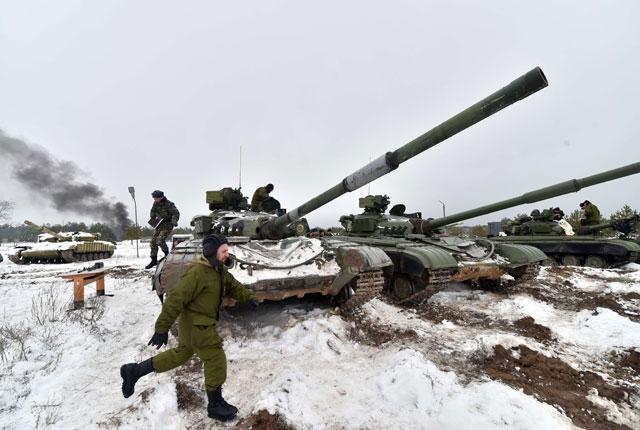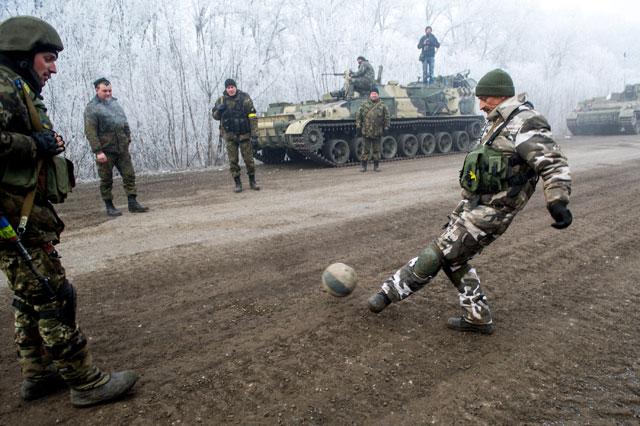You are here
Ukraine fighting rages ahead of ceasefire
By AFP - Feb 14,2015 - Last updated at Feb 14,2015

DONETSK, Ukraine — Ferocious fighting raged in Ukraine on Saturday, threatening a ceasefire deal as Kiev and the US accused Russia of fuelling a rebel onslaught to grab territory hours before the truce began.
Kiev-loyal regional police chief Vyacheslav Abroskin said constant artillery bombardments were razing the strategic railway hub of Debaltseve, where Ukrainian forces were clinging on.
"The rebels are destroying the town of Debaltseve. There are non-stop artillery bombardments of residential areas and buildings. The town is in flames," Abroskin wrote on Facebook.
Ukraine's Azov volunteer battalion also reported fierce clashes just to the east of the vital government-held port city of Mariupol and said that the village of Shyrokyne had been "practically destroyed" by shelling.
An AFP photographer in the centre of rebel stronghold Donetsk saw one woman and a man killed by shelling.
"This morning there was more shooting than normal. It is always the same before a ceasefire," Donetsk resident Marina, 52, told AFP.
Ukrainian President Petro Poroshenko warned Friday that surging fighting had plunged a peace plan reached in Minsk after marathon talks with Russian leader Vladimir Putin into "big danger" before it even got off the ground.
"After Minsk the offensive operation of Russia intensified significantly," Poroshenko said, speaking in English.
The ceasefire, due to take effect from 2200 GMT Saturday, will be the first test of the commitment by Kiev and pro-Russian separatists to the freshly inked peace plan.
But with Kiev and Washington claiming Russia was spearheading a separatist push to conquer more territory and government forces digging in, there were fears over whether the truce would be observed at all.
Poroshenko was to speak with US President Barack Obama, German Chancellor Angela Merkel and French President Francois Hollande on Saturday. The UN Security Council was meanwhile expected to meet on Sunday for an emergency session, diplomats said.
Territory grab before truce
The United States said the Russian military had deployed large amounts of artillery and multiple rocket launcher systems and was using them to shell Ukrainian positions.
Washington's ambassador to Ukraine Geoffrey Pyatt claimed on Twitter that the separatists now had more heavy weapons than some European members of NATO.
Ukrainian security spokesman Andriy Lysenko said that rebels backed up by regular Russian troops were trying to "achieve important tactical goals to extend their territory" ahead of the ceasefire.
Lysenko said that seven soldiers were killed and 23 wounded in clashes over the past 24 hours, while rebel and government officials said six civilians had died.
Kiev and the West accuse Russia of pouring arms and troops into Ukraine to bolster the rebels. The Kremlin has consistently denied the charges, but the pro-Moscow rebels boast the modern heavy weaponry of a regular army and frequently outgun Ukrainian forces.
Obama has warned he could start arms supplies to Ukraine if the new peace deal collapses.
Moscow's foreign ministry lashed out at Kiev and its Western allies on Saturday, saying that they had "begun to distort the contents of the Minsk agreements".
The surging fighting came after rebels and Kiev agreed to the wide-ranging plan on Thursday following tortuous talks in Minsk between the leaders of Russia, Ukraine, France and Germany.
Merkel has warned Russia that the EU, which has already slapped Moscow with sanctions over the crisis, is not ruling out further measures if the truce fails.
The fragile deal is seen as the best hope of ending the conflict, which has killed at least 5,480 people and ratcheted East-West tensions to levels not seen since the Cold War, but scepticism remains high after the collapse of a similar previous peace plan.
Rebel leaders — seen by the West as Kremlin puppets — have said the new deal raises hopes of peace but warned there would be no more talking if it fails.
Roadmap to peace
The new Minsk agreement is broadly similar to an earlier failed deal in September and is fraught with potential pitfalls.
Both sides have to begin withdrawing heavy weapons from the front line within two days of the start of the ceasefire to establish a buffer zone between 50 and 140 kilometres wide, depending on the range of the weapons.
The Organisation for Security and Co-operation in Europe said it "stands ready" to monitor the implementation of the ceasefire and was boosting its number of observers on the ground to 350.
Under the Minsk agreement, Kiev will also begin retaking control over the approximately 400-kilometre stretch of Russia's border with rebel-held Ukraine, but only after local elections are held.
The border is entirely under Russian and rebel control and is used, according to Kiev, as a conduit for separatist supplies.
Separatist-held territories will be granted a degree of autonomy to be established through talks.
Related Articles
Ukraine on Tuesday accused pro-Russian separatists of taking advantage of a ceasefire deal signed last September to seize more territory in the east and said Kiev would demand its return in any future peace talks.
After weeks of relentless fighting, the embattled Ukrainian rail hub of Debaltseve fell Wednesday to Russian-backed separatists, who hoisted a flag in triumph over the town. The Ukrainian president confirmed that he had ordered troops to pull out and the rebels reported taking hundreds of soldiers captive.
Fighting dropped sharply across eastern Ukraine on Sunday but there was still sporadic shelling after a ceasefire came into force, the first step in a fragile peace plan aimed at ending 10 months of conflict.














